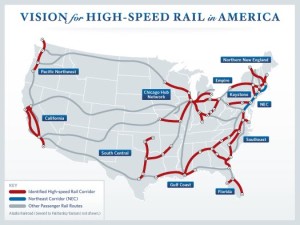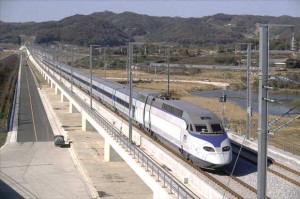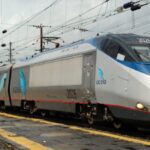High-Speed Rail – Pro and Con
When it comes to choosing sides on any issue, it’s always a good idea to compare arguments, whether it’s health care reform or tax cuts or high-speed rail. Often, when a comparison is made, it becomes clear that there are simply more and/or better arguments supporting one of the points of view … be it hard data or theory or historical precedent.
 Take, for instance, the issue of high-speed rail. The Obama Administration has allocated something a bit over $8 billion to several states for preliminary work on high-speed rail corridors. And in 2008 the voters of California approved a $10 billion bond issue to start work on a high-speed rail line linking Los Angeles and San Francisco. Opponents of all of these proposed projects have essentially three arguments:
Take, for instance, the issue of high-speed rail. The Obama Administration has allocated something a bit over $8 billion to several states for preliminary work on high-speed rail corridors. And in 2008 the voters of California approved a $10 billion bond issue to start work on a high-speed rail line linking Los Angeles and San Francisco. Opponents of all of these proposed projects have essentially three arguments:
1. People won’t ride it.
2. It costs too much.
3. I don’t want it in my backyard.
 Those of us supporting more and better passenger trains, including high-speed rail, counter with arguments that are, to my mind, a lot more thoughtful and a lot more compelling:
Those of us supporting more and better passenger trains, including high-speed rail, counter with arguments that are, to my mind, a lot more thoughtful and a lot more compelling:
1. High-speed rail will dramatically reduce the number of short-haul flights in and out of major airports.
2. High-speed rail will save energy, reduce our use of foreign oil, and cut air pollution.
3. High-speed rail is safe, reliable and provides people with an alternative to flying or driving.
4. High-speed rail projects will create jobs and boost local economies.
5. High-speed rail will redirect growth to those corridors and minimize urban sprawl.
(Of course, we could always respond to the other side’s points directly: (1) Yes, they will; (2) No it won’t; (3) Too damn bad!)




The idea that only rich people travel by Amtrak is absolutely false. You have obviously never taken one of Amtrak’s trains — long-distance or otherwise — and seen the coaches filled with very ordinary people. There are millions of people in literally thousands of small towns all over this country for whom Amtrak is the only way in or out of town. Those of us who travel in sleepers MORE than pay our own way. And I note you haven’t responded to the FACT that every form of public transportation — from the airlines to sidewalks — is subsidized in this country. Try to let go of your conservative ideology long enough to take an objective look at the concept of an integrated and balanced nationwide transportation system. That is the issue here.
I agree with you, but bro you don’t have to be so negative. Try raising their morale- it works better. :)
But we’ve tried that!
1. I object to paying the transportation costs of people who can well afford to pay their own — which certainly includes high speed train riders and anyone who chooses to work far enough from home to need high speed rail.
2. We’re smart enough, in general, that HSR will never become the preferred mode of transportation (no matter how many billions Obama pisses away on it).
3. California high speed rail:
CHSRA estimates:
Cost $50.2 billion
Ridership 65.5 million trips/year = 90,000 round trips/day
Cost per user = $559,000
Realistic estimates-
Cost $81.4 billion
Ridership 23.4 million trips/year = 32,000 round trips/day
Cost per user = $2,539,000
Any questions?
4. When you shift wealth from one group to another, the new jobs created in one place are lost in the other. What Wisconsin and Ohio loses, California gains. What California gains is lost all across America as unnecessary taxes are collected are funneled to California. There is no free lunch.
5. Do you seriously believe people would begin to live in crowded housing around train stations just because of them?! You are beyond hope.
I think Anonymous needs to visit Europe. While I would like to return to the USA as a tourist, I find the thought of those slow trains versus the horrors of security checks at airports quickly changes my mind and I go to Europe instead. I find the USA a very backward country.
Why are there no plans to connect Chicago and New York/Washington by high speed?
1. I gather you object to any subsidy for rail. But ALL forms of public transportation are subsidized by government. Are you also in favor of making the airlines pay for construction and maintenance of airports and for the air traffic control system? I thought not … so it’s just subsidizing RAIL that you’re against! (Oh, wait … I see you’re also against unions, too.)
2. That’s not what’s happened in Europe where high speed rail is the preferred means of personal travel. (But, of course, we’re so much smarter than those European socialists, aren’t we.)
3. Those numbers are preposterous.
4. Try telling that to the out-of-work workers in Wisconsin and Ohio!
5. Development that has actually happened along transit routs everywhere else in the country directly contradicts this statement.
“Too damn bad!” What a thoughtful comment, no doubt meant to stimulate a fair and thoughtful discussion. Thoughtful and compelling. That’s the first though I had for sure.
In that spirit, let me respond to YOUR SIDE’s points, directly:
1. Probably not but, if it does, it will be because of government funds competing with private industry. Instead of a struggling-to-be-healthy airline industry, we’ll have an equally unhealthy alternative sucking public money into union coffers like an Electrolux.
2. If you think shifting one tenth of one percent of personal travel from planes to trains is going to save the planet, I have a bridge in New York you might be interested in.
3. To be fair (which is more than you are), I’m going to give you this one. Indeed, HSR would provide an alternative. Of course the alternative would cost as much as $500,000 to $2 million per daily passenger but, hey, why should you care, eh?
4. Actually, it will TRANSFER jobs TO places that build HSR FROM places that don’t … at the expense of taxpayers who live nowhere near HSR and will never have need or occasion to ride it.
5. It will allow more people (selfishly) to commute longer and longer distances at a fraction of the true cost at the expense of hard working Americans who choose to live closer to their jobs or work closer to home. It won’t minimize sprawl. Rather, it will spread sprawl to undeveloped or sparsely developed land around stations.